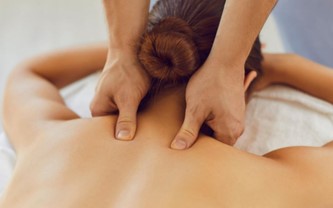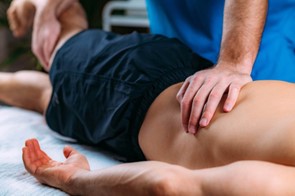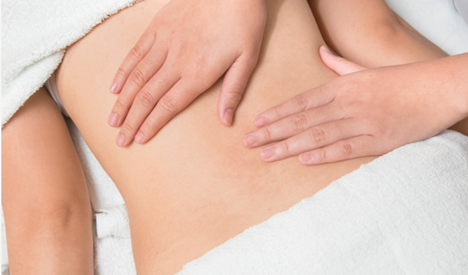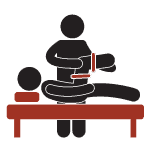Massage Therapy services at Alliston and Tottenham physio clinics
Contact UsWhat is massage therapy?

Massage therapy is the manipulation and mobilization of soft tissue using various compression and decompression techniques. Massage therapy has been around for centuries and continually evolving for clinical, therapeutic and palliative purposes. It is a form of therapy that is used to promote healing and relaxation. While medication can be effective in managing pain, it is not always the best option for everyone. Fortunately, there are alternatives, such as massage therapy to help reduce pain.
What are the different types of massage therapy?

- Deep Tissue Massage:
- Muscles can become tight for various reason (i.e. injury, stress, tension etc.)
- This type of massage will get deep into muscles and tendons to help release tension
- It is best for people with injuries, general tightness and chronic muscle pain
- Sports Massage:
- This is similar to a deep tissue massage, however typically will target specific muscle groups that are sore after physical activity
- It is best for individuals who play sports, or simply the prevention of injury
- Myofascial release:
- Myofascia is connective tissue under our skin, that connects everything to anything
- This type of massage will work through releasing the fascia with kneading and stretching
- It is excellent for individuals with tightness in neck, shoulder or back
- Lymphatic Massage:
- Lymphatic has several important actions such as maintaining fluid levels and removing waste products in our body
- This type of massage uses gentle touch to help lymphatic fluid flow more easily
- It is used best for individuals with inflammation, arthritis or post mastectomy
- Swedish Massage:
- Feeling stressed, a Swedish massage is a classic go to type of massage for relaxation
- It is often gentler, includes the whole body and therefore is good for people new to massages
What does massage therapy treat and help with?

As mentioned, massage therapy has been used for multiple dysfunctions and impairments, to help people better manage and improve their quality of life. What are some of the specific things massage therapy can help with?
1. Pain Management
Massage therapy is an effective tool to help manage your pain, whether it is acute or chronic pain. It helps to reduce pain by reducing inflammation, promoting circulation and relaxation fo the body.
2. Reduces Inflammation
Inflammation is a natural response to an injury or illness, however, with chronic inflammation it can lead to longer lasting issues. Massage therapy can help to reduce inflammation in the affected areas by increasing blood flow, promote the release of the body’s natural anti-inflammatory chemicals and reduce tension in specific parts of the body.
3. Improve Circulation
Having good circulation is important for many reasons. More specifically, it is essential for delivering oxygen and nutrients to our tissues and organs. It also helps to carry away waste products that we create in our body. When circulation is impaired, pain and prolonged inflammation can occur. Massage therapy can help to improve circulation by increasing blood flow to the affected area and promote lymphatic drainage.
4. Reduce Stress and Promote Relaxation
Stress is a common trigger and exacerbation of pain. Massage therapy can help with release of the “feel-good” hormones such as serotonin and dopamine. Overall, this can lead to reducing pain and overall increase in feeling of emotion and physicality.
5. Reduce Anxiety
The calm felt after a massage can aid in reducing stress. Our body has 2 different nervous system, our fight or flight which gets activated in stressful situations, and our parasympathetic nervous system which is activated with relaxation and rest. A massage is thought to increase our parasympathetic activity, which can decrease feelings of anxiety.
6. Improves Sleep
As previously mentioned, massage can decrease cortisol and increase serotonin, which can translate to benefiting those who suffer from insomnia.
What to expect at your massage appointment and how often should you get a massage?
Before a massage, it is best to avoid consuming a heavy meal. It is also recommended to drink plenty of water and stay hydrated, to help prepare your muscles for the massage. After the massage, it is also important to stay well hydrated. Gentle stretching and continued movement is also recommended.
Typically, a massage session lasts between 60 and 90 minutes, but depending on your needs, you may benefit from a shorter or longer session. During the massage, it is important to communicate with your massage therapist and give them feedback on anything you are feeling (i.e. too much pressure, too little pressure etc.).
The frequency of your massage therapy appointments will be discussed at your initial appointment, to determine the best course of action for you. The frequency may vary from weekly, every 2 weeks or monthly appointments.
Do you think a massage therapy appointment is right for you? Our registered massage therapist located at our Alliston clinic is ready to help you get back to your better self! Call South Simcoe Physiotherapy today or contact us here.
MANUAL AND MANIPULATIVE THERAPY
Our therapists use a variety of hands on techniques to both accurately assess and efficiently treat patients. Specialized training through the Orthopaedic Division of the Canadian Physiotherapy Association (orthodiv.org) allows for accurate diagnosis and faster recovery. Fellows of the Canadian Academy of Manipulative Physiotherapists (FCAMPT) have taken extensive post-graduate training and have received international recognition in hands on techniques.
manippt.org
CONCUSSION MANAGEMENT
At South Simcoe Physiotherapy we have training in the Shift Concussion Management Program (shiftconcussion.ca). Using this program as a basis, we thoroughly assess the individual systems often effected in a concussion using a variety of tests, as well as cognitive tools such as imPact. Once an accurate assessment has been performed, we develop a multi-faceted rehabilitation strategy to return the individual to optimal function.
PELVIC HEALTH
massage therapy
Massage therapy is a form of hands in treatment that affects the body’s soft tissues such as the muscles, connective tissue, ligaments, tendons and joints. Massage therapy can have therapeutic effects on the muscular, circulatory, and nervous systems. For more information on Registered massage therapy please visit: www.rmtao.com
acupuncture
Acupuncture is rooted in Traditional Chinese Medicine and uses tiny needles which are inserted into various points in the body. Acupuncture stimulates the body’s natural healing mechanisms and is effective in treating a variety of conditions including headaches, back pain, neck pain, various overuse and sports injuries. Our therapists have training in acupuncture through Acupuncture Canada ( https://www.acupuncturecanada.org)
RUNNING ASSESSMENT / GAIT ANALYSIS
Gait analysis and Running Assessments can be useful in determining biomechanical irregularities during either walking or running that are either causing or are caused by a certain condition or injury. Gait analysis can also help to identify inefficiencies that may be reducing performance in runners and perhaps predisposing or contributing to injury.
We use multiple tools to analyze a person’s gait. First, we use our physiotherapy backgrounds and knowledge of biomechanics. By observing someone walking/running/using the treadmill (and perhaps recording them) we can often identify these major faults. A biomechanical exam can also aid in this process through identifying structural limitations, muscle weakness and tone, and a variety of other potential faults. Finally, using training from courses such as those taught at The Running Clinic https://therunningclinic.com/en, can help to consolidate all of this information while allowing us to make recommendations on items such as footwear, training schedules, and other information relevant to your specific situation.
IMS/IDN
Intramuscular Stimulation and Integrated Dry-Needling. Both IMS and IDN are forms of dry needling where an acupuncture needle is inserted into a taut band in a shortened muscle or near the nerve root in order to cause a reflex relaxation of the muscle, a micro trauma to stimulate natural healing and create an action potential to restore normal nerve conduction. This technique can be extremely useful to treat chronic pain, myofascial pain syndromes, many sports injuries, and overuse injuries. For more information visit: www.istop.org
exercise prescription
Exercise is an essential part of all rehabilitation programs. In order to restore normal muscle length and strength, correct biomechanical faults and return to function, exercises need to be specifically tailored to suit individual needs.
custom bracing
shockwave therapy
Shockwave is a non-invasive way to treat many muscular, tendinous, ligamentous, and bone problems that lead to pain and loss of function. Briefly stated it uses strong energy pulses to stimulate increased blood flow and metabolism allowing regeneration of damaged tissue. A phenomenon called “micro-cavitation” occurs where “bubbles’ expand and burst creating a force that penetrates damaged tissue and stimulates cell reparation. Shockwave is especially effective in treating issues that have been unresponsive to other conservative methods.
VIDEO AND TELEPHONE CONSULTATIONS
At a time when social distancing is necessary, we are pleased to be able to offer our exceptional care in an alternative method. Video consultations (think FaceTime or Skype) can be an effective method to assess and treat musculoskeletal and other physiotherapy appropriate impairments. A thorough analysis can be conducted by performing a detailed subjective, observing individual movements, performing simple tasks and special tests, and evaluating the environmental factors which are aggravating the condition. From there, our therapist can devise an appropriate treatment plan including self management strategies, modifications, and exercises appropriate to address your condition. The therapist is easily able to demonstrate the exercises and observe you performing them, and can even send you video demonstrations of the exercises. For those that are unable to access reliable internet, or do not regularly use a computer, telephone consults are also an option.
No doctor's referral is necessary and these sessions are covered by most insurers
NATUROPATHY
Frequently Asked Questions
What is physiotherapy?
Simply stated, physiotherapy is the treatment of deficits and disease without the use of medications. Physiotherapy is useful for the majority of injuries and ailments one might suffer. The goal of our physiotherapists is to reduce your symptoms and allow you to return to function in a timely manner. If you are unsure if your condition is appropriate for physiotherapy, please feel free to contact us.
How do I pay for your services?
Does OHIP cover physiotherapy?
Do I need a doctor’s referral to come and see you?
What do I need to wear for my assessment?
Will my private insurance cover the cost of this treatment?
What if my injuries are as a result of a motor vehicle accident or workplace injury?
- Date of accident
- Claim number
- Adjuster’s name and contact information
- Private health insurance information (if applicable)
- Area of injury
We are able to direct bill your motor vehicle insurance, but please note that all of your private health insurance must be used prior to accessing your motor vehicle insurance. These rules are mandated by the Financial Services Commission of Ontario and not our clinic.
Workplace injury (WSIB): we often treat people as a result of a workplace injury, however, we do not bill WSIB directly. If your injury is part of a WSIB claim, you are expected to pay just as other clients and then submit your invoices to WSIB.


